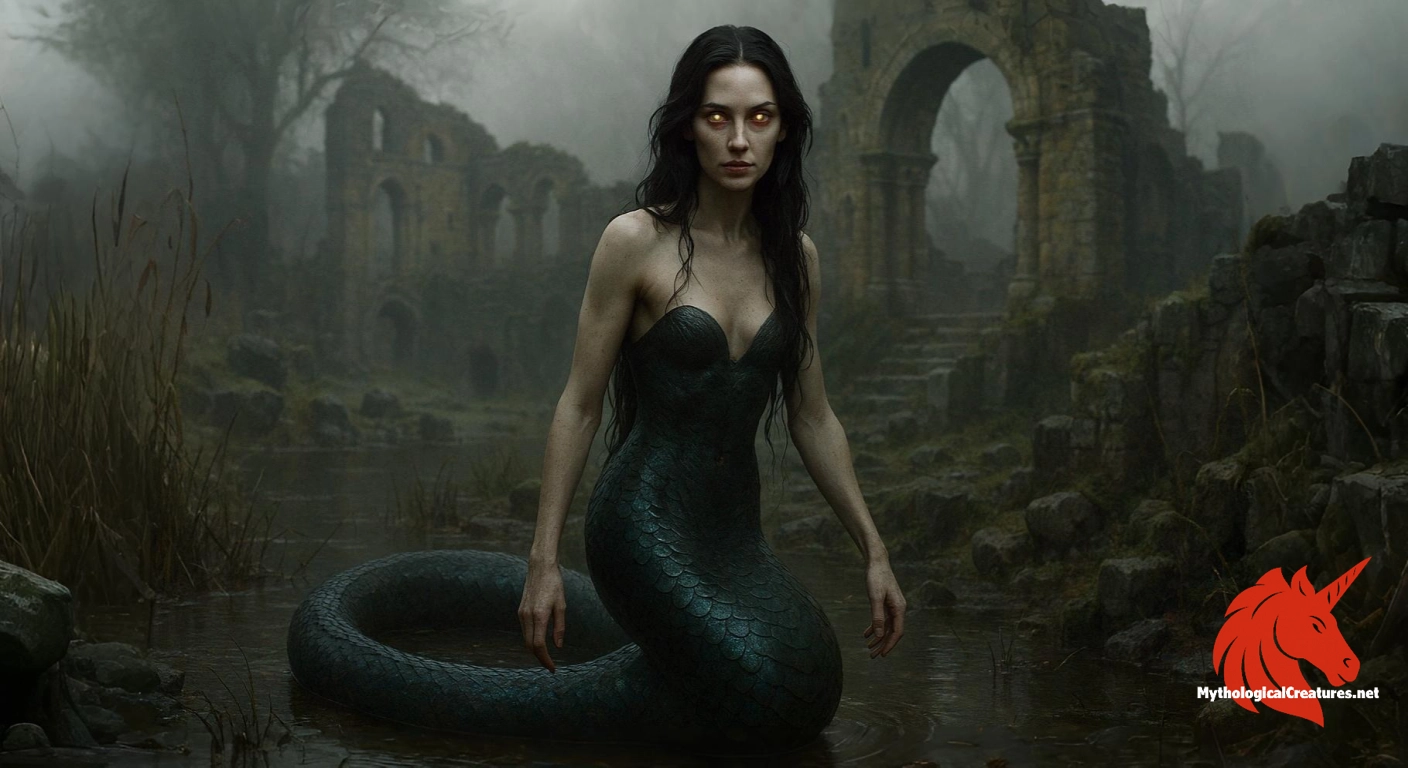Abyzou: Abyzou is a female demon from Near Eastern and European folklore, infamous for causing miscarriages and infant mortality.

Abyzou
Abyzou - Abyzou embodies ancient fears surrounding fertility and the hazards of childbirth, serving as a cautionary figure in folklore.
Origins & First Encounters
Abyzou emerges from ancient myth as a uniquely formidable and enigmatic female demon whose legacy spans the Near East and Europe. Her origins are shrouded in mystery, with early attestations found in syncretic magical traditions that attempted to explain the inexplicable tragedies of childbirth. Her narrative, intertwined with themes of envy and infertility, offers a potent symbol for the destructive powers attributed to unfulfilled desire. Her story is rich with cultural context, reflecting societal fears about reproductive loss and the fragility of life. The demon’s name has evolved through myriad linguistic adaptations, each variant capturing different aspects of her character and influence. She was often invoked in tales that sought to explain miscarriages and infant mortality, casting her as an agent of misfortune driven by deep-seated envy. The layers of her myth suggest not only a malevolent spirit but also a tragic figure burdened by her own cursed existence. Early magical texts reveal her as a force that bridges the natural with the supernatural, embodying human anxieties about fertility and loss. Her reputation is one of complex duality, simultaneously feared and respected as a reminder of nature's capricious power.
Source Texts & Tale Variants
The primary literary source that offers the most detailed account of Abyzou is the Testament of Solomon, a compendium where her character is intricately depicted amidst a host of demonic entities. Over centuries, various grimoires and magical texts have contributed alternative narratives, each adding layers of detail and nuance to her myth. Manuscripts from antiquity and the Early Middle Ages present her story in multiple spellings and under a variety of names, thereby expanding her mythological status. In addition to the Testament, numerous amulets and inscriptions from syncretic cultural practices further attest to her enduring presence. These sources often depict her role in relation to infant mortality, emphasising her envious nature and her personal curse of infertility. Variations in her narrative across these texts reflect the broad spectrum of beliefs surrounding the supernatural in different periods. The diverse accounts provide a mosaic of interpretations, blending historical fact with imaginative myth-making. Each version of her story contributes critical insights into how ancient societies grappled with the mysteries of life and death, underscoring her lasting influence in demonology.
Form & Powers
Iconography associated with Abyzou consistently portrays her with attributes that merge the human with the serpentine or piscine. She is often depicted with a sinuous, elongated form that hints at the undulating movements of a serpent, while retaining distinctly feminine features. In various amulets and talismanic objects, her image is rendered with scales, fins, or a serpent-like tail that emphasises her otherworldly origin. Some artistic representations capture her with a human face juxtaposed against reptilian eyes, underscoring an uncanny blend of allure and menace. The visual depictions vary across different eras, ranging from almost entirely humanoid figures to illustrations imbued with overt aquatic or reptilian characteristics. The coexistence of these disparate elements within her image symbolises an internal duality, suggesting both nurturing and destructive capacities. Her physical manifestation serves as a stark visual metaphor for the unpredictable and often perilous forces governing fertility and mortality. Even when details diverge, a recurring theme of hybrid form reinforces her status as a liminal figure, straddling the boundaries between the natural and the supernatural.
Regional Faces
The myth of Abyzou adapts remarkably across regions, reflecting the varied cultural landscapes in which she is invoked. In Coptic Egypt, for instance, she is identified with the figure known as Alabasandria, a name that evokes local interpretations steeped in the traditions of ancient magical practice. Within Byzantine culture, she takes on the guise of Gylou, a variant that aligns her more closely with the established iconographic themes of that era. In the Near East, her depiction often incorporates elements of both terrestrial and aquatic mythology, mirroring the complex interplay of natural forces observed in the region. European traditions, meanwhile, tend to emphasise her role as a bringer of misfortune to mothers and infants, linking her directly to fears surrounding childbirth. Variations in her name and form across these regions illustrate the adaptive nature of myth, as local beliefs reshaped her narrative to address unique societal concerns. Each cultural adaptation enriches her character, adding layers of symbolism and meaning that resonate with local experiences of loss and danger. This diversity of regional portrayals underscores how Abyzou functions as a mirror to the anxieties and spiritual needs of distinct communities.
Cultural Parallels
When contrasted with other mythological figures, Abyzou occupies a unique niche that intersects with wider themes found in female demonic archetypes. Her role in imperilling newborn life brings to mind parallels with creatures like Lilith, whose own narrative is intertwined with themes of fertility and malevolence. Similar to the Greek Lamia, who was also associated with the harmful effects on children, Abyzou embodies the fear of the unknown aspects of reproduction that have historically challenged communities. These comparisons underscore a recurring motif in animistic and pagan traditions, where female entities are cast in roles that symbolise both creation and destruction. The convergence of aquatic and serpentine imagery in her depictions further links her to a broader spectrum of mythic beings that straddle the boundary between human and beast. This overlapping symbolism invites a comparative analysis that highlights common cultural responses to the mysteries of birth and death. Despite these similarities, Abyzou’s specific narrative—rooted in the themes of envy and personal infertility—distinguishes her from other legends. Her story contributes to a broader tapestry of mythological characters whose roles serve as both cautionary and explanatory figures in ancient societies.
Legacy & Modern Evolution
The evolution of Abyzou’s image over the centuries reveals a fascinating shift from a straightforward demon of infertility to a multifaceted symbol of the dark feminine. In early tradition, her terrifying presence was intrinsic to folklore aimed at explaining the inexplicable tragedies of childbirth and infant loss. As time progressed, interpretations of her myth expanded to encompass broader notions of female power and vulnerability, reflecting changing societal attitudes towards reproduction and female agency. In modern occult circles and artistic expressions, Abyzou is often reimagined as a complex figure whose story resonates with issues of empowerment and the subversion of traditional gender roles. Contemporary depictions have shifted from portraying her solely as a harbinger of misfortune to embracing her as an emblem of the unpredictable nature of feminine energy. This evolving portrayal has been influenced by modern reinterpretations that seek to reclaim aspects of ancient myth in ways that challenge conventional narratives. Her enduring presence in literature, art, and popular culture—whether in gothic novels or experimental visual arts—illustrates her lasting impact. The legacy of Abyzou serves as a reminder of how myth can both shape and reflect societal anxieties, while also adapting to the evolving cultural landscape of each new era.
Interesting Fact
Abyzou uniquely embodies the paradox of infertility and its harmful projection, where her own inability to bear life is externalised as a curse upon others.
For publishers and studios
Your next readers are already here
Many of our visitors are looking for books, campaigns, and resources that deepen their journey into myth. Position your title or setting here.
Discuss a placementQuick Creature Info
Associations:
Our Mythic Legendary Rating:

Also Sometimes Known As:
Habitat:
Supernatural Powers:
Physical Attributes:
Abilities:
Behavior:
Lore:
References
Discover Another Mythical Legend You May Not Have Heard Of?
Uncover the mysteries of ancient folklore and expand your knowledge of legendary beings from cultures around the world.
Dare to Meet the Vishnu....
Curated by the Mythological Creatures Team
Series editor: Mythological Creatures Directory
Primary desk: Hellenic & Ancient Mediterranean Desk
(rev. November 2025)
